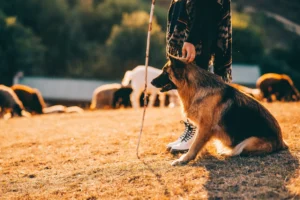Introduction

German-Shepherd
The German Shepherd, or Deutscher Schäferhund, is one of the most popular and versatile dog breeds in the world. Known for its intelligence, loyalty, and strength, this breed has earned its place as a top working dog in various fields such as police and military work, search and rescue, and service dog roles. Whether working in serious, high-stakes environments or simply serving as a loving family pet, the German Shepherd continues to impress dog owners and professionals alike.
History of the German Shepherd
The German Shepherd’s history dates back to the late 19th century in Germany, where the breed was developed by Max von Stephanitz, a German dog breeder. Von Stephanitz’s goal was to create a dog that was highly trainable, strong, and versatile enough to perform various tasks, particularly herding sheep. By carefully selecting and breeding dogs for these traits, von Stephanitz established the foundation for the German Shepherd we know today.
The breed’s name is a direct reference to its original purpose: “Schäferhund” translates to “shepherd dog” in English. Although initially bred for herding, the German Shepherd quickly gained popularity in other roles due to its incredible working abilities. In fact, the breed’s first major breakthrough outside of herding came during World War I, where German Shepherds were used as messenger dogs, sentries, and even for detecting enemy soldiers.
Physical Characteristics
German Shepherds are medium to large-sized dogs with a strong and muscular build. Males typically weigh between 65 to 90 pounds, while females are slightly smaller, ranging from 50 to 70 pounds. Standing about 22 to 26 inches tall at the shoulder, they are agile and powerful animals with an impressive physical presence.
The breed’s most striking physical feature is its dense double coat. The outer layer consists of thick, straight fur, while the undercoat is soft and dense, helping to protect the dog from extreme weather conditions. German Shepherds come in a variety of colors, including black, tan, sable, and even all-black or all-white varieties, though the most common coloration is the black and tan mix.
Temperament and Personality
German Shepherds are renowned for their intelligence, making them one of the easiest breeds to train. They are highly responsive to positive reinforcement and thrive in environments where they are given tasks to accomplish. However, this intelligence can also mean that they need mental stimulation to stay engaged and avoid boredom. Without proper activity and training, they can become anxious or develop destructive behaviors.
In terms of temperament, German Shepherds are loyal, protective, and courageous. They are particularly known for their devotion to their families, making them excellent companions and watchdogs. Their protective nature can make them excellent guard dogs, but they are also highly social and tend to get along well with their owners, children, and other pets if properly socialized from a young age.
However, their protective instincts mean that early socialization is critical. German Shepherds must be exposed to different people, animals, and environments to ensure they are well-rounded and less likely to become overly territorial or aggressive.
Training and Socialization
Training a German Shepherd is often a rewarding experience due to their eagerness to learn. The breed is often used in police, military, and search-and-rescue teams because they can learn complex tasks quickly and reliably. Whether it’s basic obedience training or specialized tasks, such as search-and-rescue operations or serving as guide dogs, German Shepherds excel when provided with consistent training and structure.
However, it’s important to remember that, like any intelligent breed, they require mental stimulation. Lack of mental and physical exercise can lead to destructive behavior, such as chewing, digging, and excessive barking. Regular walks, training sessions, and activities like agility or puzzle games will help keep your German Shepherd happy and well-behaved.
You can also learn about complete training of German Shepherd.
Exercise Needs and Health Considerations

German-Shepherd
German Shepherds are an active breed that requires plenty of exercise. They enjoy activities such as running, hiking, and playing fetch, and need at least 1-2 hours of physical exercise per day. Their high energy levels make them a great choice for active individuals or families who can provide them with the time and attention they need.
As with all breeds, the German Shepherd is prone to certain health conditions. Hip and elbow dysplasia are common concerns, especially in larger dogs, as these joint issues can lead to arthritis and pain. Regular veterinary check-ups, a proper diet, and maintaining a healthy weight can help mitigate some of these risks. Additionally, German Shepherds can be prone to bloat (gastric torsion), which requires immediate medical attention if symptoms appear.
German Shepherds as Family Pets
Although initially bred for work, German Shepherds have become beloved family pets due to their loyalty, affection, and protective nature. They tend to form strong bonds with their owners and are often very affectionate, especially with children. Their intelligence and trainability also make them great family dogs, as they can quickly learn household rules and interact well with children and other pets when properly socialized.
However, their high energy levels mean that they need more than just love and attention—they need activity. Without enough physical and mental stimulation, they can become bored and frustrated, which may lead to behavioral issues.
Conclusion
The German Shepherd is a remarkable breed that combines intelligence, loyalty, and versatility. Originally bred for herding, they now excel in many roles, from working dogs in law enforcement to loving family companions. W h ile they require significant attention, training, and exercise, they offer an unparalleled bond with their owners and are dedicated, protective, and affectionate pets. For the right person or family, a German Shepherd can be a faithful and devoted companion for years to come.
You may also learn about husky dog which has a good behaviour with the owners.
by sajjad sardar